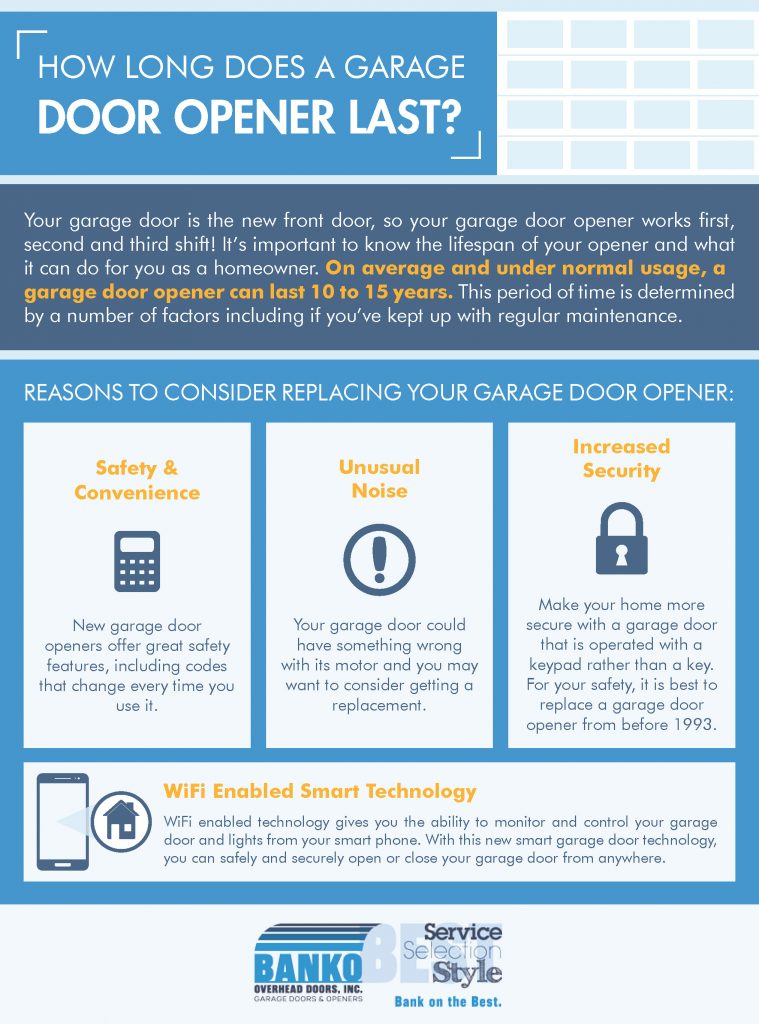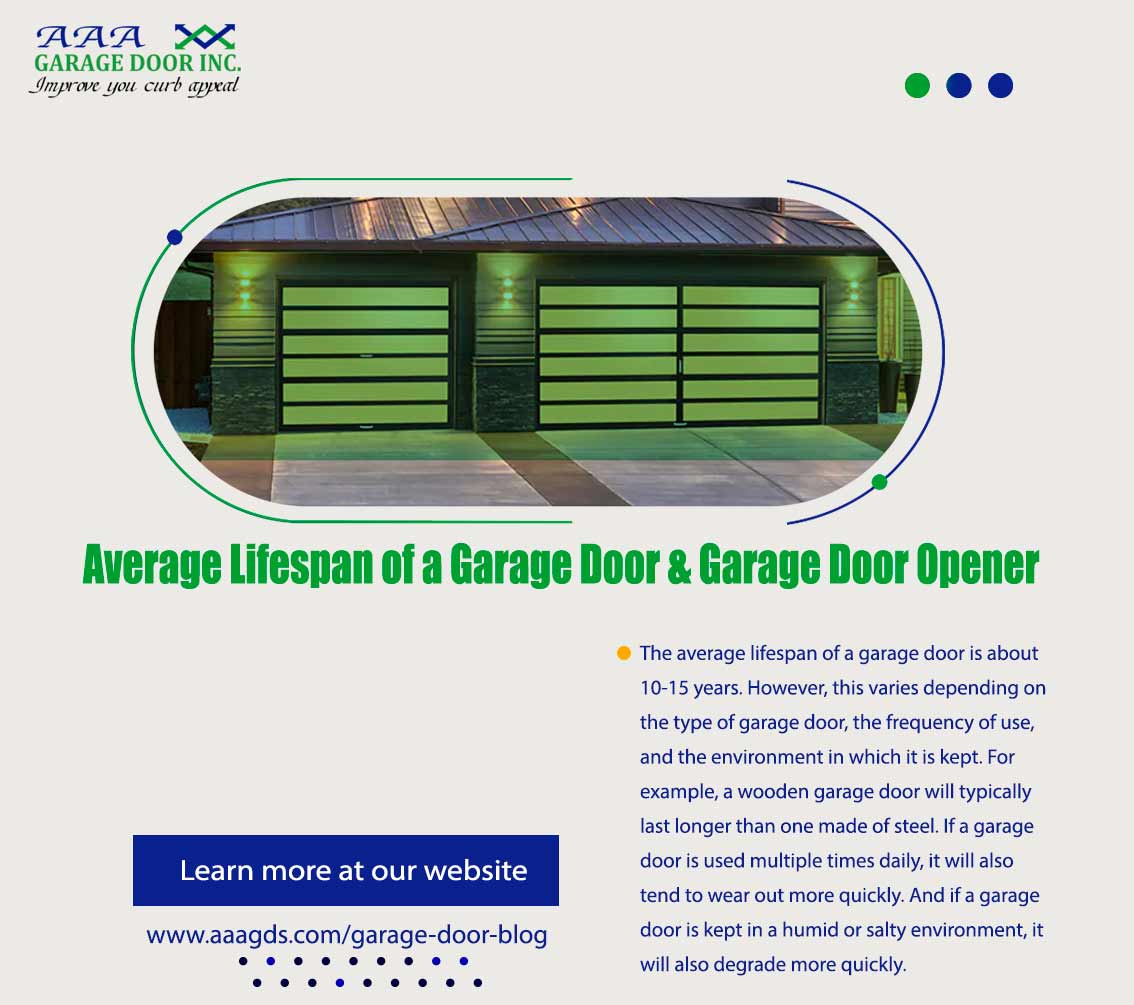So, you’re wondering about the average lifespan of a garage door opener? Well, you’ve come to the right place! In this article, we’re going to dive into the fascinating world of garage door openers and uncover just how long they typically last.
Picture this: you’re sitting in your car, ready to leave for school or grab a bite to eat, and with just a simple push of a button, your garage door effortlessly opens up, allowing you to drive out smoothly. It’s a convenience we often take for granted, but have you ever stopped to think about how long these magical door-opening devices actually last?
Well, get ready to find out! In the following paragraphs, we’ll explore the factors that influence the lifespan of a garage door opener, so you can have a better idea of how long you can expect yours to stick around. Get comfy and let’s get started!

What’s the Average Lifespan of a Garage Door Opener?
Garage door openers are an essential part of any modern home. They provide convenience and security, allowing homeowners to easily access their garages without having to manually open and close the doors. However, like any other mechanical device, garage door openers have a limited lifespan. Understanding the average lifespan of a garage door opener can help homeowners plan for potential repairs or replacements. In this article, we will provide detailed information about the average lifespan of a garage door opener, factors that can affect its longevity, and tips for extending its lifespan.
The Average Lifespan of a Garage Door Opener
The average lifespan of a garage door opener is typically around 10 to 15 years. This estimate, however, can vary depending on several factors, such as the quality of the opener, frequency of use, and maintenance practices. High-quality garage door openers from reputable brands tend to have a longer lifespan compared to cheaper, low-quality options. Additionally, if a garage door opener is used frequently, such as in households with multiple vehicles or high activity, its lifespan may be shorter due to increased wear and tear.
Regular maintenance plays a crucial role in extending the lifespan of a garage door opener. Simple tasks such as lubricating moving parts, tightening loose screws and bolts, and cleaning the photo-eye sensors can help prevent premature wear and ensure smooth operation. Following the manufacturer’s recommended maintenance schedule and addressing repairs promptly can also contribute to a longer lifespan for the garage door opener.
In some cases, external factors such as extreme temperatures, power surges, or improper installation can affect the lifespan of a garage door opener. Excessive heat or cold can put additional strain on the opener’s motor and components, potentially shortening its lifespan. Power surges caused by lightning strikes or electrical issues can also damage the opener’s circuitry. Furthermore, if the opener is not installed correctly or if it is not compatible with the garage door’s weight and size, it may experience premature failure.
Factors That Influence Garage Door Opener Lifespan
Several key factors can influence the lifespan of a garage door opener:
- Quality: The quality of the garage door opener plays a significant role in determining its lifespan. High-quality models with durable components tend to last longer than cheaper alternatives.
- Frequency of use: Garage door openers that are used frequently, such as in homes with multiple vehicles or high activity, may have a shorter lifespan due to increased wear and tear.
- Maintenance: Regular maintenance, including lubrication, tightening of screws and bolts, and cleaning of sensors, can help extend the lifespan of a garage door opener.
- External Factors: Extreme temperatures, power surges, and improper installation can all impact the lifespan of a garage door opener.
Tips for Extending the Lifespan of a Garage Door Opener
To maximize the lifespan of your garage door opener, consider the following tips:
- Regular maintenance: Follow the manufacturer’s recommended maintenance schedule and perform simple tasks such as lubrication, tightening, and cleaning regularly.
- Address repairs promptly: If you notice any issues with your garage door opener, such as unusual noises, slow operation, or safety sensor problems, address them promptly to prevent further damage.
- Opt for professional installation: Ensure that your garage door opener is installed correctly by hiring a professional installer. They will ensure compatibility with your garage door and make any necessary adjustments for optimal performance.
- Protect against power surges: Consider investing in a surge protector specifically designed for garage door openers to protect against power surges that could potentially damage the opener’s circuitry.
- Monitor and adjust garage door balance: A garage door that is improperly balanced can put strain on the opener, leading to premature wear. Regularly check the balance and adjust if necessary.
Additional Information about Garage Door Opener Lifespan
While understanding the average lifespan of a garage door opener is essential, it is also important to consider additional information related to their longevity.
Signs of a Failing Garage Door Opener
Knowing the signs of a failing garage door opener can help homeowners proactively address any issues before complete failure occurs. Some common signs include:
- Excessive noise during operation
- Slow or erratic movement
- Failure to respond to remote or wall button commands
- Inconsistent or non-functioning safety sensors
- Frequent need for repairs
If you notice any of these signs, it may be time to consider repairing or replacing your garage door opener.
Benefits of Upgrading to a New Garage Door Opener
While garage door openers have a finite lifespan, upgrading to a new one once your current opener reaches the end of its lifespan can offer several benefits:
- Improved safety features, such as rolling code technology
- Enhanced security features, including smartphone connectivity for remote monitoring and control
- Quieter and smoother operation
- Energy-efficient options
- Improved compatibility with smart home systems and integration
By upgrading to a new garage door opener, homeowners can take advantage of these additional features and enjoy the convenience and security they provide.
In conclusion, the average lifespan of a garage door opener is typically between 10 to 15 years. However, factors such as quality, usage frequency, maintenance, and external factors can influence its lifespan. By following regular maintenance practices and addressing repairs promptly, homeowners can extend the lifespan of their garage door openers. Additionally, upgrading to a new opener once the current one reaches the end of its lifespan can provide enhanced safety, security, and convenience. Remember to monitor the signs of a failing opener and take action accordingly to ensure the smooth and reliable operation of your garage door system.
Key Takeaways:
- The average lifespan of a garage door opener is around 10 to 15 years.
- Regular maintenance can help extend the lifespan of a garage door opener.
- Frequent use of the opener can reduce its lifespan.
- Quality of the opener and its components can affect its lifespan.
- Replacing worn-out parts can improve the longevity of a garage door opener.
Frequently Asked Questions
Welcome to our FAQ section where we answer common questions about the average lifespan of a garage door opener. If you’re wondering how long your garage door opener is expected to last, you’ve come to the right place. Check out these helpful Q&A pairs:
1. How long does a typical garage door opener last?
The average lifespan of a garage door opener is around 10 to 15 years. However, this can vary depending on various factors such as usage, maintenance, and the quality of the opener itself. With regular maintenance and care, you can extend its lifespan.
Factors like extreme weather conditions, frequent power outages, and lack of maintenance can shorten the lifespan of a garage door opener. It is a good practice to have a professional inspect and service your opener periodically to ensure it is functioning optimally and to catch any potential issues early on.
2. Can a garage door opener last longer than 15 years?
Yes, it is possible for a garage door opener to last longer than 15 years with proper maintenance and care. Regularly lubricating the moving parts, ensuring the sensors are aligned, and keeping the opener clean can help prolong its lifespan.
If your garage door opener is approaching the 15-year mark, it’s a good idea to have it inspected by a professional to determine if any parts need to be replaced or if any adjustments need to be made to keep it running smoothly for years to come.
3. What are some signs that my garage door opener may need to be replaced?
If you notice any of the following signs, it may be an indication that your garage door opener needs to be replaced:
– Unusual noises such as grinding or squeaking
– Slow or erratic opening and closing
– Frequent breakdowns or malfunctions
– The opener struggles to lift the door or stalls halfway
If you experience any of these issues, it’s best to consult with a professional who can assess the situation and recommend the most appropriate course of action, whether that’s repairing or replacing the opener.
4. Can I install a new garage door opener myself?
While it is possible to install a new garage door opener yourself, it’s generally recommended to hire a professional for installation. Garage door openers involve electrical connections and complex mechanisms, and improper installation can lead to safety hazards or malfunctioning.
Hiring a professional not only ensures proper installation but also gives you the opportunity to ask any questions and receive guidance on how to operate and maintain the opener effectively, maximizing its lifespan.
5. How can I maximize the lifespan of my garage door opener?
Here are a few tips to help extend the lifespan of your garage door opener:
– Perform regular maintenance, including lubricating moving parts and cleaning the opener.
– Make sure the sensors are aligned correctly and free from obstructions.
– Avoid overloading the opener by ensuring the door is well balanced and not excessively heavy.
– Keep an eye out for any signs of wear or damage and address them promptly.
By following these simple steps and regularly servicing your garage door opener, you can maximize its lifespan and enjoy hassle-free operation for years to come.

What is the Typical Life Expectancy of a Garage Door Opener?
Summary
So what’s the average lifespan of a garage door opener? Well, it really depends on a few factors. Generally, you can expect a garage door opener to last around 10-15 years with regular maintenance. However, the quality of the opener and how often it’s used can also affect its lifespan. Taking good care of your garage door opener, such as lubricating moving parts and replacing worn-out components, can help it to last longer. Remember, if you notice any unusual noises or problems with your garage door opener, it may be time to consider a replacement.
In conclusion, while there isn’t a fixed lifespan for a garage door opener, proper maintenance and care can prolong its lifespan. So make sure to take care of your opener, and it will serve you well for many years.

